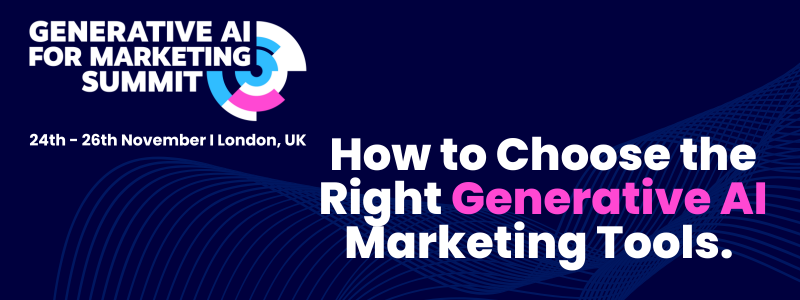How to Choose the Right Generative AI Marketing Tools

Selecting the appropriate marketing tools in today’s complex digital environment is no easy feat, especially when each comes with a network of possibilities and all promise a transformative outcome. The task is not only about choosing between the latest or most popular technologies, but also about deciding which tools align with your specific business goals and how they can be seamlessly integrated into your existing processes and workforce. The convergence of Generative AI and marketing has created a multitude of platforms, services, and innovations, which can now be intertwined with every marketing practice, all the way from strategy creation to full-blown execution. This article aims to cut through the noise and help you choose the right AI marketing tools that can genuinely make a difference to your role as a marketer.
The Role of Generative AI in Modern Marketing
Generative AI has emerged as a key player in modern marketing strategies, facilitating enhanced decision-making processes and operational efficiencies. Its ability to process and analyse massive amounts of data at speed provides marketers with insights that were previously unimaginable. AI's capacity for data analysis, pattern recognition, and predictive analytics gives marketers unprecedented insights into consumer behaviour and market trends. This technology not only helps in understanding current customer preferences but also in anticipating future needs, thereby enabling more strategic planning and execution.
AI's role extends beyond mere data analysis. It catalyses innovation, driving new ways to engage with audiences and personalise their experiences. By automating routine tasks, Generative AI allows marketers to focus on strategic initiatives that require human creativity and insight, thereby enhancing overall productivity. The integration of AI into marketing strategies signifies a shift from reactive to proactive marketing, where decisions are guided by data-driven insights rather than intuition alone.
AI in Social Media Marketing
The integration of AI in social media marketing exemplifies its transformative impact. Platforms like Facebook, Instagram, and Twitter are leveraging AI to enhance user experience and ad targeting. AI algorithms enable the analysis of vast datasets to identify consumer sentiments, preferences, and engagement patterns. This empowers marketers to curate personalized content and optimize timing for maximum reach and effectiveness. With AI, marketers can segment audiences with precision, ensuring that the right message reaches the right people at the right time.
Additionally, AI tools can automate social media monitoring and engagement, providing real-time responses to customer inquiries and feedback. This not only improves customer satisfaction but also builds brand loyalty. AI-driven analytics offer insights into which types of content resonate most with audiences, allowing marketers to refine their strategies for better engagement. As a result, AI in social media marketing not only enhances content delivery but also fosters deeper connections with audiences through personalised interactions.
AI-Generated Content
The advent of AI-generated content marks a significant shift in content creation paradigms. Through Generative AI, marketers can produce high-quality, engaging content at scale, augmenting human creativity with machine efficiency. This amalgamation not only accelerates content production but also maintains the creative integrity essential for brand storytelling. AI tools can generate everything from blog posts and articles to social media updates and product descriptions, saving time and resources for marketing teams.
Furthermore, AI-generated content can be tailored to individual consumer preferences, ensuring relevance and engagement. By analysing user data and behaviour, AI can suggest content topics and formats that are most likely to resonate with target audiences. This level of personalisation enhances user experience and drives higher conversion rates. While AI-generated content is an invaluable tool, it is crucial for marketers to maintain oversight to ensure quality and authenticity in their messaging.
How to Evaluate Digital Marketing Tools
Due to the plethora of digital marketing tools available, it means that a rigorous evaluation framework is needed to work out the most suitable options for your specific organisational needs. With countless options ranging from email marketing platforms to advanced analytics tools, choosing the right ones can be overwhelming. Key considerations include understanding the unique needs of your organisation, the goals you aim to achieve, and the resources available for implementation and management.
Functionality and Integration
A tool's functionality must align with the strategic objectives of the organisation. It's important to assess whether the tool offers the features necessary to accomplish your marketing goals and whether it can scale with your business growth. Furthermore, seamless integration with existing MarTech systems is paramount to avoid operational disruptions and to leverage synergies across platforms. A well-integrated system can enhance data flow and provide a holistic view of marketing efforts, enabling more informed decision-making throughout the team.
Additionally, evaluating the user-friendliness and support offered by the tool provider can significantly impact the implementation process. Tools that are intuitive and come with comprehensive support and training resources are more likely to be adopted successfully by teams. In the current digital climate, choosing tools that are adaptable and can integrate with future technologies ensures long-term viability and return on investment.
Compliance and Ethical Considerations
In the realm of AI marketing, compliance with ethical standards and regulatory requirements is imperative. The deployment of AI solutions must be accompanied by a robust framework for ethical AI marketing, ensuring transparency, fairness, and accountability in all automated processes. Organisations must be vigilant about data privacy laws, such as GDPR and CCPA, and ensure that their marketing practices do not infringe on consumer rights.
Moreover, ethical considerations extend to the way AI is used to influence consumer behaviour. Marketers should be transparent about the use of AI in their strategies and avoid manipulative tactics that could erode trust. By fostering an ethical approach to AI marketing, organisations can build stronger relationships with consumers and enhance their brand reputation. Implementing ethical guidelines and conducting regular audits are essential steps in maintaining integrity in AI-driven marketing initiatives.
To learn more about brand storytelling, strategic implementation, leveraging predictive analytics, plus so much more, head to Part 2!



